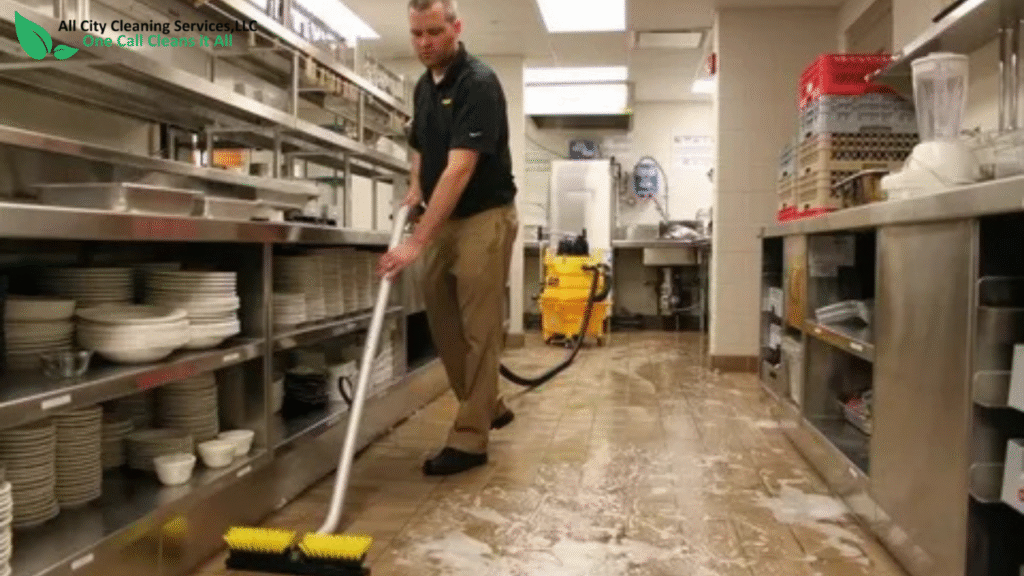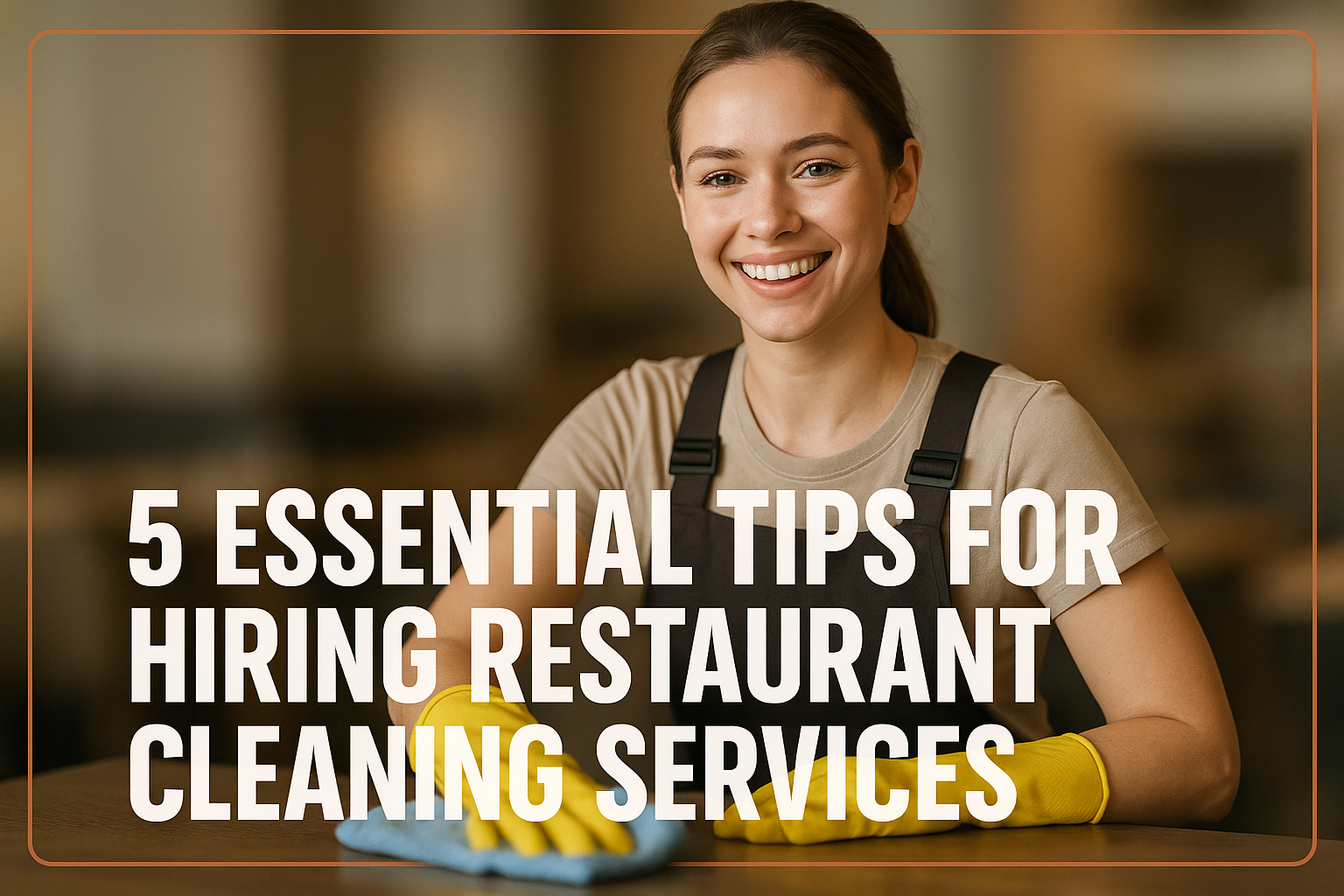Just one health code violation in the highly competitive restaurant sector can cost you a substantial amount of thousands of dollars and, just as important, your hard-built reputation, and even close your doors at times. Research indicates that close to 60% of restaurants that collapse are associated with poor sanitation and cleanliness. Cleanliness is not only a cosmetic issue, but it is the backbone of the success of your restaurant.
Unless you think any commercial cleaning service will suffice, then you are mistaken. Due to the regulations concerning food safety and the high demand of customers, as well as regular contact with grease and food residues and bacteria, restaurants face cleaning requirements that are unique. It is important to select a professional restaurant cleaning service that correctly recognizes such difficulties to safeguard your business in case of health inspection, ensure a shining customer comment, and establish long-term confidence with customers.
Why Restaurant Cleaning Requires Specialized Expertise
Restaurants are difficult to clean compared to ordinary commercial areas. The food preparation, combined with the high foot traffic, grease accumulation and the stringent regulatory control requires very specialized knowledge.
- Food Safety Regulations: Restaurants are required to comply with very strict health department standards in cross-contamination, allergen and cleaning agents that are food safe.
- High-Contamination Zones: Some areas and devices are frequently contaminated by food and grease as well as by spills and customers, such as kitchens, dining areas, restrooms and entryways.
- Specialized Cleaning Requirements: Commercial restaurant cleaning services should not be limited to cleaning on the surfaces they have but also provide deep cleaning of grease pits, exhaust system, and food contact surfaces should be thoroughly sanitized.
- Risk of Hiring the Wrong Partner: The generic commercial cleaners may face controversies in contamination and inspections, and face expensive fines.
Professional cleaning services for restaurants tailor their processes, equipment, and staff training specifically to this environment, safeguarding both your customers and your business.
Verify Industry Experience and Food Safety Knowledge
Experience and food safety skills are not compromised when choosing restaurant cleaning services.
- The importance of Industry Experience: Cleaning a restaurant is an activity that demands knowledge of specific hazards, such as grease hazards and the issue of eliminating cross-contamination issues in the food preparation departments.
- Food Safety Rules: Your cleaning servers ought to be aware of local and state health codes and undergo intensive training on food handler safety, including ServSafe.
- Equipment Familiarity: They have previous experience of handling kitchen equipment like ovens, fryers and grease tabs without becoming distorted.
- Check Credentials: Inquire about certifications, training programs and years of business experience.
Ensure They Offer Comprehensive Restaurant-Specific Services
Cleaning the restaurant does not consist only of wiping tables. You require an assistant in cleaning who goes over each of the important spots thoroughly and frequently.
- Kitchen Cleaning: Hood systems, exhausts, ovens, grills, and fryers have to be periodically cleaned and greased.
- Floor Care: Restaurants can also have tile or concrete or wood floors that will need to be stripped, waxed, or treated in order to be durable and safe.
- Front-of-House Services: Provisions, seating, washrooms and entryways should be kept impeccable so as to improve customer experience.
- Back of Stuff Cleaning: It is important to have deep cleaning of the refrigeration units, trash disposal areas, and storage rooms.
Essential Services Your Restaurant Needs
- Removal of the exhaust system and cleaning up of kitchen hoods.
- Degreasing and Sanitization of equipment.
- Floor stripping and waxing
- Cleaning of the refrigeration unit.
- Maintenance of the eating place and furniture.
- Sanitization and deep cleaning of the restroom.
- Response and collection of garbage and recycling.
Deep Cleaning vs. Daily Maintenance
Surface wiping and trash removal are done in the day-to-day maintenance but deeper cleaning services make sure that they get rid of the accumulations and those contaminants that are not easily seen.
Check for Proper Licensing, Insurance, and Compliance
The credentials of your cleaning company save you the liability and regulatory risks.
- Licensing: State business licenses and permits are valid.
- Insurance: General liability and workers’ compensation insurance a form of insurance that provides accidents or property damage.
- Bonding: Covers theft of employees.
- OSHA Compliance: Workers are supposed to adhere to safety measures at the workplace.
- Food-Safe Products: It is important to use EPA-approved sanitizers without food environment hazards.
- Documents: Ask to produce certificates of all credentials and document them.
Essential Credentials to Verify
- Certificates of business licence and insurance.
- Cleaning products Safety data sheets.
- Background checks and training records of the employees.
Protecting Your Business From Liability
Employment of an unlicensed or uninsured cleaner may leave you vulnerable to lawsuits, fines and a tarnished reputation in case accidents or contamination of the cleaning takes place.

Evaluate Their Flexibility, Scheduling, and Reliability
The restaurants are on a strict schedule, the cleaning service should be able to work in your schedule.
- Off-Hours Availability: Cleaning during the off-peak hours i.e., late night or early morning, is important.
- Emergency Cleaning: The skill to act promptly on spills or any request for inspection saves your reputation.
- Regular Staff: Have your identical cleaning staff develop a familiarity with your facility so that there is quality control.
- Communication: Clear, responsive points of contact enhance coordination/troubleshooting.
- Backup Plans: It is important to make sure that the cleaning service can be available to cover absences so that your schedule is not affected.
Scheduling That Works in Your Restaurant
How many hours do you clean restaurants a day?
Are you able to accept emergency or last-minute clean-ups?
The Reliability Factor
- Are we always getting the same team?
- What do you do in case of staff absence or emergency?
Compare Pricing Models and Contract Terms Carefully
The strategy of pricing low may be more expensive in the long run in cases where the standards of cleaning become inadequate.
- Pricing Structures: Be aware of flat-rate, hourly, or per-service pricing and what it covers.
- Hidden Costs: Beware of the additional costs on supplies, deep cleaning or emergency calls.
- Contract Length: Flexible contracts include contracts that have trial periods that minimise risk.
Questions to Ask During the Consultation Process
Prepare a list to cover all critical areas during vendor meetings:
- What is the number of restaurants that you served?
- Which cleaning products do you use to clean your food with?
- Are you able to offer insurance certificates and licenses?
- Do you wash out hoods and exhaust systems very frequently?
- How do you manage emergencies such as cleanups?
- Is your cleaning team constantly the same?
- Is it possible to tailor your services to the needs of my restaurant?
- This is what are your pricing models/ contract terms?
- What is your quality control mechanism?
It is possible to see a site visit and identify professionalism, the quality of equipment, and staff behavior.
Warning Signs: When to Keep Looking
Be cautious of cleaning companies that exhibit any of the following red flags:
- None of the Restaurants References
Unable to provide the references of other restaurant clients.
- Absence of Insurance or Licensing
Do not have valid insurance certificates or business licenses.
- Unrealistically Low Prices
Come in with too-cheap prices, which cannot be true.
- Poor or No Online Reviews
Have bad reviews or no feedback that can be proved by customers.
- No Written Contracts
They are unwilling to give written contracts.
- Unclear Cleaning Protocols
They are unable to articulate their cleaning practices and standards.
- None of the Employee Background or Safety Checks
No background checks, no safety training of staff.
- Pushy Sales Tactics and No Customization
Pressure you to sign without considering your restaurant’s specific needs.
The Benefits of Choosing the Right Restaurant Cleaning Partner
Success in health inspections: You pass the surprise inspections without being afraid of being violated.
- Better Customer Experience: A Clean dining place leads to excellent feedback and follow-up business.
- Productivity and Morale of the Staff: Clean areas simplify the work of employees and make them happier.
- Zero Long-term Cost Saving: Repair, pest infestations, and fines will not occur because of active maintenance.
- Powerful Butterfly: The strategy of a strong partnership enables collaboration to address emerging restaurant demands.
The right cleaning service is more than a vendor; they’re a partner in your restaurant’s ongoing success.
Conclusion:
Contracting the service of professional restaurant cleaners is a critical decision that does not directly affect your image and profit. These are the 5 tips that can help you make a choice: Check experience and food awareness, demand comprehensive special services, ensure all requirements are met, analyze flexibility and reliability of schedule, and compare prices and conditions of the contract attentively.
Your restaurant needs a cleaning company that has an understanding of the challenges and rules involving food service industry. Rush slow, pose the correct questions and select a crew that believes in doing everything they can to make your place pristine, hazardous and prosperous.
With professional assistance and good service, All City Cleaning, the cleaning services leader, should be reached and trusted with the specific restaurant-based commercial cleaning services.
FAQ’s
Restaurants are also specialized areas that need cleaning that is required of to meet food safety laws and that grease is dealt with correctly by specialized cleaners as opposed to general cleaners.
Beyond taking care of the daily cleaning, a deep cleaning such as hood and exhaust cleaning, is usually performed quarterly or under the local health codes requirement.
Find food safety training such as ServSafe, appropriate licenses, insurance and background checks of employees.
Yes, professional services are normally clean during off-hours so as not to interfere with your restaurant.
Services covered, pricing rate, frequency, cancellation and assurances should be discussed in the contract.
Ask them to provide safety data sheets and ensure they use sanitizers that are approved by EPA and which are safe in food areas.
None of the restaurant experiences, without licenses or insurance, unstable staff, indefinite contracts, or sales pressure






